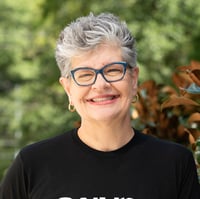Why Financial Planners Should Facilitate Multigenerational Conversations
Share this
Society has a strange relationship with money. It's often considered crass, rude, or intrusive to talk about, so we avoid it, even within our own families. As a financial planner, you have a unique opportunity to change this dynamic for your clients. You normalize discussing money and financial challenges every day, but are you bridging the generational divide or just tackling one family at a time?
Building intergenerational conversations into your planning is beneficial for your clients and your business. The transfer of wealth happening today is substantial, and by creating relationships with the adult children of your elderly clients, you can reduce the likelihood of those assets walking out the door after your clients pass away. By facilitating these crucial conversations, you can also serve your younger clients who may be receiving an inheritance.
Serving your clients as a fiduciary means helping them have conversations that honor the wishes of the wealth creators, guide the recipients, and create a lasting legacy for future generations. Addressing wealth transfer proactively increases the chances you'll continue to manage those assets, brings peace of mind to your aging clients, and provides much-needed guidance to new clients who may not be comfortable with their newly acquired wealth.
Addressing the Needs of Aging Clients
As your older clients age, you can bring them peace of mind by giving them a chance to articulate their vision for their legacy. You provide a space for them to make informed decisions based on their life expectancy and improve their quality of life. By connecting with experts and service providers for the aging, you add value for both your clients and their adult children, putting everyone's minds at ease.
Consider a typical scenario: an elderly client in their 80s with adult children spread across the country, busy with their own careers and families. The parents want to stay in their home but don't know what options are available to help them age in place safely. They might even be in denial about the dangers that could arise.
This is where you, the planner, come in. You can discuss their options and refer them to a local council on aging. You can help them find someone to assess their home for modifications that would make aging in place safer, like grab bars, bathroom renovations, or a wheelchair ramp. You can also help them understand they have the resources to afford some in-home care for things like meal prep. Why would a planner venture into this realm? Because you understand their financial situation and the impact these decisions have on their long-term spending. It's better to invest in a ramp now than in assisted living after a broken hip later.
Acknowledging the Unspoken Concerns of Adult Children
While their parents are aging, those adult children often have no idea how much money their parents have. They don't know if they should be planning to help pay for care, and they might not even know how to talk about it with their siblings. People are often afraid that bringing up money looks like a "money grab," but the opposite is more often the case. Adult children aren't trying to steal the money; they want to know their parents are going to be okay and be able to plan accordingly if they aren't.
You can provide a safe space by scheduling an official meeting to discuss what everyone wants to talk about, but can't figure out how to start. You can do this on Zoom or in person. Britta Koepf, CFP®, ChSNC®, an XYPN member, offers to treat her clients and their adult children to dinner so they can discuss cross-generational finances in a relaxed environment. Don't underestimate the value of a non-family member helping to nudge this conversation along so everyone can share their fears, concerns, and wishes with one another.
Bridging Gaps Within Families
Blended families can add even more complications. Adult children often desperately need a clear understanding of what happens to which assets when their parents pass away. They may not even understand who is responsible for what as their parents age. Our society has a gap in facilitating these conversations before a health crisis forces them. You can bridge that gap so your clients and their families aren't learning everything from a hospital social worker.
These conversations aren't just for different generations, either; many couples aren't talking to each other about these topics. People often assume they will know when it's time to move to assisted living, but that's not always the case. You can help by suggesting these conversations take place during the planning process, setting specific check-in dates or ages, and reminding clients of the financial implications of their decisions.
By normalizing conversations about aging, you ensure no assumptions are made and that partners understand one another's wishes. This is a natural extension of facilitating estate planning and can even lead to end-of-life discussions, like funeral planning.
You might be thinking, "I'm a financial planner; I didn't sign up for this!" In another society, that might be true, but if not you, then who? Something as simple as planning a funeral has financial implications, because a grieving relative might be susceptible to an upcharge that the person who earned the wealth would not have wanted.
The Planner’s Role: Objectivity and Guidance
Ultimately, you provide objectivity, neutrality, and accountability for the changes your clients commit to. You also have a unique opportunity to watch for signs of cognitive decline. You should include a periodic health check-in, as any changes can impact financial projections. Dr. Carolyn McClanahan, M.D., CFP® notes, “In addition to longevity planning, a health history is important for health care expense planning, long-term care discussions, disability insurance, estate planning, and the very important event of preparing you for the curve balls health problems may cause.” Life expectancy directly impacts planning.
Getting Started
The next step is to create a system and make these conversations part of your routine. You can engage your younger planners to help bridge the gap with adult children clients. You don't have to take on every single family member, but they can be clients of the firm. Create a specific time within your annual planning process to facilitate these conversations and add this value to your planning services.
As you begin to welcome multiple generations into your practice, Mark Parrett, CFP® , another XYPN member, states that "multigenerational money conversations MUST begin with a multigenerational family vision." This helps eliminate the feeling that the younger generation is just waiting for the money. Mark shares that older generations feel so honored by this that great conversations happen, even when strained relationships exist. When you nail the vision, all the money ends up connected to that family's unique place in the world.
Chad Holmes, CFP®, CPWA®, also believes strongly in communicating between generations about what family members want to accomplish with their money. In his book, The Inheritance Playbook, Chad states, "This is their legacy, a torch proudly burning that does not extinguish with their life but continues to shine well beyond their years." He encourages his clients to find out what their parents wish for their legacy so the money can be used in a way that honors those wishes, be that college for grandchildren, travel, or the security they may have lacked growing up.
By proactively integrating intergenerational wealth discussions into your practice, you not only elevate the financial well-being of your clients across generations but also strengthen your firm's longevity and impact. You become more than a financial advisor; you become a vital facilitator of family harmony and a trusted guide through life's most significant transitions.

About the Author
Arlene Moss gets a kick out of helping financial advisors get over being overwhelmed and take on their frustrations so their businesses soar. Arlene works to ensure XYPN members are able to help their clients prosper while creating a sustainable business model. Through XYPN Academy and one-on-one coaching, members get the support they need to grow their businesses and overcome the challenges that come their way.
Share this
- Advisor Blog (726)
- Financial Advisors (248)
- Growing an RIA (129)
- Business Development (100)
- Digital Marketing (97)
- Marketing (94)
- Community (82)
- Coaching (76)
- Start an RIA (76)
- Compliance (72)
- Running an RIA (72)
- Client Acquisition (68)
- Technology (67)
- Entrepreneurship (64)
- XYPN LIVE (64)
- Fee-only advisor (50)
- Sales (49)
- Bookkeeping (46)
- Client Engagement (45)
- Practice Management (44)
- Scaling an RIA (43)
- XYPN Books (43)
- Investment Management (41)
- Financial Education & Resources (35)
- Client Services (31)
- Employee Engagement (31)
- Lifestyle, Family, & Personal Finance (31)
- Market Trends (30)
- Journey Makers (26)
- Process (18)
- Niche (13)
- SEO (9)
- Career Change (8)
- Partnership (8)
- Sapphire (7)
- Transitioning Your Business (7)
- Persona (4)
- Social Media (4)
- Transitioning To Fee-Only (4)
- Emerald (3)
- Transitioning Clients (3)
- Onboarding (2)
- RIA (2)
- Transitioning to a Corporate RIA Affiliation (1)
Subscribe by email
You May Also Like
These Related Stories

Coaching For Leveraging Partnerships: Collaborating with Other Professionals in Your Community
May 12, 2025
4 min read

Coaching for Better Time Management: Prioritizing Organic Growth in Your Daily Routine
April 7, 2025
5 min read






